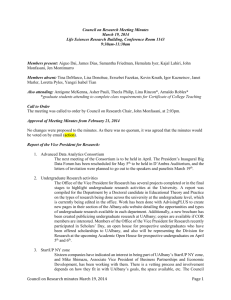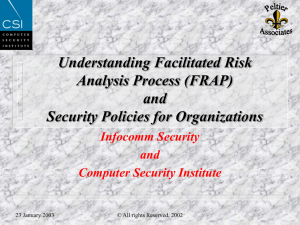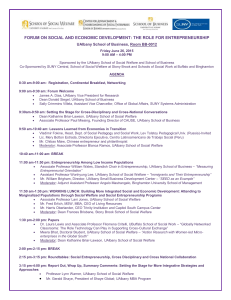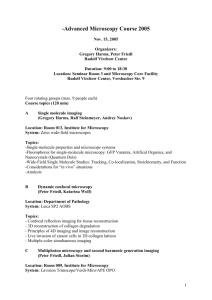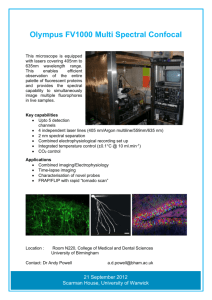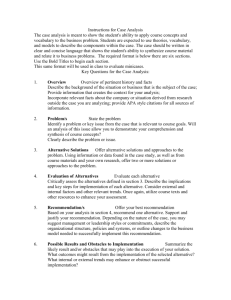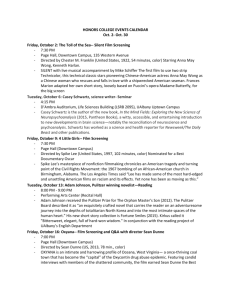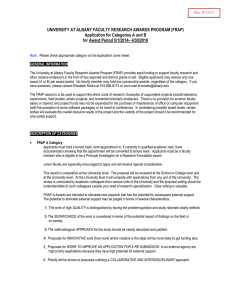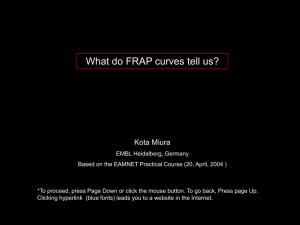February 25, 2014 - University at Albany
advertisement
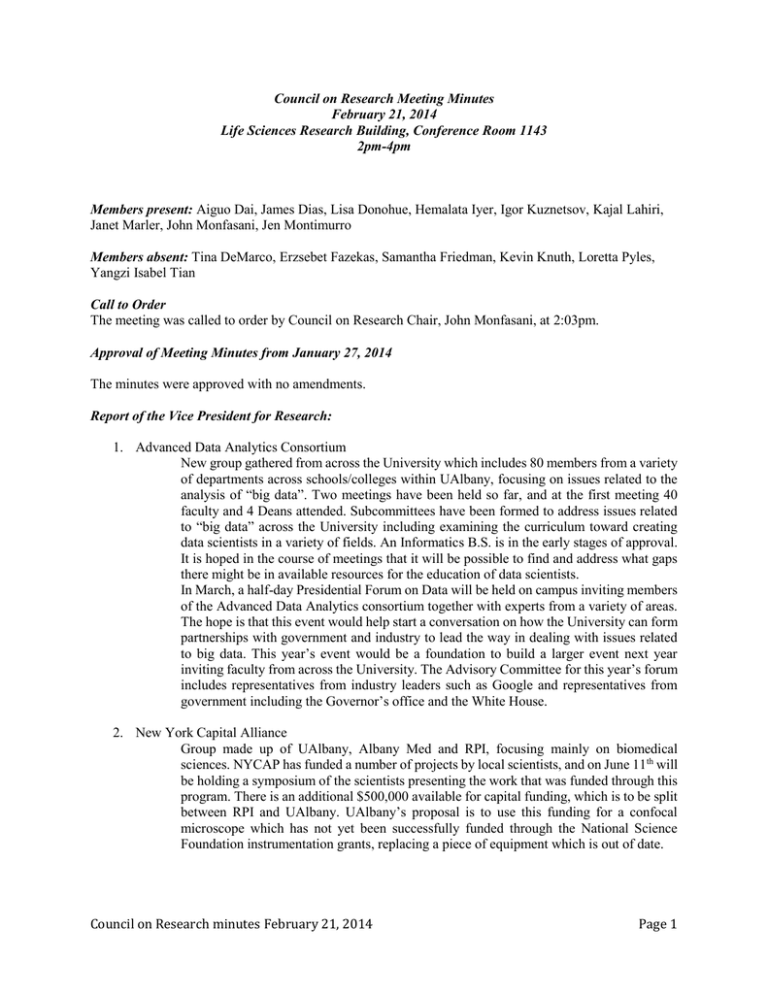
Council on Research Meeting Minutes February 21, 2014 Life Sciences Research Building, Conference Room 1143 2pm-4pm Members present: Aiguo Dai, James Dias, Lisa Donohue, Hemalata Iyer, Igor Kuznetsov, Kajal Lahiri, Janet Marler, John Monfasani, Jen Montimurro Members absent: Tina DeMarco, Erzsebet Fazekas, Samantha Friedman, Kevin Knuth, Loretta Pyles, Yangzi Isabel Tian Call to Order The meeting was called to order by Council on Research Chair, John Monfasani, at 2:03pm. Approval of Meeting Minutes from January 27, 2014 The minutes were approved with no amendments. Report of the Vice President for Research: 1. Advanced Data Analytics Consortium New group gathered from across the University which includes 80 members from a variety of departments across schools/colleges within UAlbany, focusing on issues related to the analysis of “big data”. Two meetings have been held so far, and at the first meeting 40 faculty and 4 Deans attended. Subcommittees have been formed to address issues related to “big data” across the University including examining the curriculum toward creating data scientists in a variety of fields. An Informatics B.S. is in the early stages of approval. It is hoped in the course of meetings that it will be possible to find and address what gaps there might be in available resources for the education of data scientists. In March, a half-day Presidential Forum on Data will be held on campus inviting members of the Advanced Data Analytics consortium together with experts from a variety of areas. The hope is that this event would help start a conversation on how the University can form partnerships with government and industry to lead the way in dealing with issues related to big data. This year’s event would be a foundation to build a larger event next year inviting faculty from across the University. The Advisory Committee for this year’s forum includes representatives from industry leaders such as Google and representatives from government including the Governor’s office and the White House. 2. New York Capital Alliance Group made up of UAlbany, Albany Med and RPI, focusing mainly on biomedical sciences. NYCAP has funded a number of projects by local scientists, and on June 11th will be holding a symposium of the scientists presenting the work that was funded through this program. There is an additional $500,000 available for capital funding, which is to be split between RPI and UAlbany. UAlbany’s proposal is to use this funding for a confocal microscope which has not yet been successfully funded through the National Science Foundation instrumentation grants, replacing a piece of equipment which is out of date. Council on Research minutes February 21, 2014 Page 1 3. Networks of Excellence 4E Network - Five $135,000 projects have been funded through the 4E network including some proposals from UAlbany; additional smaller proposals such as $5,000-$10,000 proposals to convene meetings are currently being funded, including a proposal led by Chris Thorncroft and DAES for a Severe Weather meeting; the hope is that people would be enabled to write grants as a result of these meetings. SUNY BRAIN- Largely involving Stony Brook and UBuffalo as they have more advanced high-tech facilities; however, UAlbany has a very strong neuroscience program and Li Niu and Christine Wagner are championing UAlbany involvement in the network. Health- The Health network received 52 letters of intent for projects, and 25 of those have been invited to apply for funding including letters of intent from Larry Schell and Paul Agris. 4. Vice President Dias provided copies of the “Research Moving Forward” recommendations being submitted to his office by Provost’s Fellow Jennifer Manganello as discussed at the January meeting. Committee Reports 1. FRAP Awards Committee The FRAP subcommittee met twice to review the FRAP award applications and to discuss changes to the FRAP award application guidelines. Twenty-six applications were reviewed for this year’s FRAP-A awards, and of those 13 were recommended for funding. Scores given by reviewers were averaged and rankings determined by comparing the average scores. In the case where three applications all received the same score, priority was given to junior investigators in accordance with the guidelines. After discussion, it was generally agreed that all applicants should receive feedback on their application, with no indication as to who the reviewer was that generated the feedback. It was proposed that this feedback be sent out with their notifications from the Vice President for Research, and they should be encouraged to re-apply. This was put to a vote and unanimously passed. The committee’s recommendations for funding were then put to a vote and unanimously passed. FRAP subcommittee chair Igor Kuznetsov provided the Council with the recommendations of the committee for number of changes to the FRAP guidelines as discussed at their second meeting: 1) Recommendation: Allow just one faculty member to be a Principal Investigator and classify all other significant contributors/collaborators as co-PIs. Modify the wording on page 1, paragraph 3 to reflect a single applicant: “FRAP application can have only one Principal Investigator. Applicant must hold a tenure track, term appointment or, if currently in qualified academic rank, have documentation showing that the appointment will be converted to tenure track. Applicant must be a faculty member who is eligible to be a Principal Investigator on a Research Foundation award. The itemized Budget must clearly state the role of and budget allocated for each co-PI.” Council on Research minutes February 21, 2014 Page 2 This would allow people to be co-PIs on multiple applications, and allow for more transparency in terms of what part of the budget they would be allocated (if any). It was noted that the wording that the applicant must hold a tenure track, term appointment or, if currently in qualified academic rank, have documentation showing that the appointment will be converted to tenure track excludes a number of researchers on campus. This issue was tabled for discussion at a future meeting. (action) The recommendation of the committee to modify the wording of the guidelines to allow only one PI was put to a vote and approved. 2) Recommendation: The applicant must disclose all available sources of funding. Add a bullet “Other Support” to the FRAP application requirements, following “Itemized Budget”, and “Other Support” page to the application form with the following header: “Provide details of all active funding available to the PI. Other Support includes all financial resources available in direct support of an individual’s research endeavors, including but not limited to research grants, cooperative agreements, contracts, and/or institutional awards, including startup funds” It was agreed that there was a lack of transparency in the applications with regard to what funding applicants already had available to them, and whether any funds already available could be re-budgeted to cover the costs of what they were requesting from FRAP. This new wording would provide additional information to the review subcommittee who would then be in a better position to make a decision on funding with all the facts. It was suggested for further clarity that the wording be slightly amended as follows: “Provide details of all active funding available to the PI. Other Support includes all financial resources available in direct support of all of the individual’s research endeavors, including but not limited to research grants, cooperative agreements, contracts, and/or institutional awards, including startup funds” The recommendation with the new wording as amended in the meeting was put to a vote and passed. 3) Recommendation: Address the issue of the lack of citations in some applications. Modify “Project Narrative” bullet in FRAP requirements to include “describe the proposed project including: major theses of the project and investigator’s understanding of the subject matter supported by relevant key literature citations.” Make the list of citations mandatory. Add a bullet “References cited” after “Project Narrative” with the following header: “The References Cited section does not count toward the five page limit set for Project Narrative. However, only up to 25 references are allowed and the references should be limited to relevant and current literature. It is important to be concise and to select only those literature references pertinent to the proposed research. Each reference must include names of all authors (in the same sequence in which they appear in the publication), the article title, journal or book title, volume number, page numbers, and year of publication.” There was some discussion as to whether it was necessary to specify the exact format reference citations should take. It was generally agreed that the reference must be a complete citation so that the work cited could be easily found. It was also noted that Council on Research minutes February 21, 2014 Page 3 different fields have different formats for their citations, and choosing one over another might discourage some people from applying. It was agreed to modify the wording as follows: “The References Cited section does not count toward the five page limit set for Project Narrative. However, only up to 25 references are allowed and the references should be limited to relevant and current literature. It is important to be concise and to select only those literature references pertinent to the proposed research following standard citation format in your discipline.” It was moved to approve this recommendation for change to the guidelines as modified, put to a vote and passed unanimously. 4) Recommendation: In order to clarify FRAP eligibility replace the sentence in the first paragraph of the first page “No faculty member may hold two consecutive awards, regardless of the category” with the following: There must be at least a 12-month gap between funding periods, regardless of the category. A faculty member cannot apply for FRAP if he/she has an open FRAP account, regardless of category.” There were no objections to the new wording and it was put to a vote and passed unanimously. Old Business 1. Absenteeism Following on from discussion at the last meeting, John Monfasani proposed the following procedure in relation to future absenteeism from COR: If a member of COR misses three consecutive meetings, the member is automatically dropped from COR and the Chair is authorized to seek a replacement through the Chair of the Senate. This proposal was put to a vote and passed with no objections. Chair John Monfasani will bring this and the recommendations for changes to the FRAP guidelines to the Senate for approval at their next meeting. (action) 2. Conference Awards- guidelines revision Following discussion of the Conference Awards at the December meeting, subcommittee chair Aiguo Dai brought the following recommendation for change to the conference support awards application guidelines from the subcommittee: Current guidance: Conferences eligible for this award must be held at UAlbany and/or in the immediate Capital District in order to maximize the visibility of the University to national and international conference participants and to allow as many UAlbany students to attend the conference as possible. Proposed change: Conferences eligible for this award must be held at UAlbany and/or in the immediate Capital District in order to maximize the visibility of the University to national and international conference participants and to allow as many UAlbany students to attend the conference as possible. To attract participants from business and other private sectors, certain conferences held at the SUNY Global Center in New York City may also be considered eligible for this award. Council on Research minutes February 21, 2014 Page 4 The change was discussed briefly and the concern was raised that it might be problematic to specify one venue for exceptions; questions were asked whether additional venues might be considered, and whether there might be qualifying venues in the future that didn’t exist yet. It was agreed that this would require additional discussion, and the proposal was tabled for discussion at the next meeting. The meeting was adjourned at 4:00pm. Submitted by Elizabeth Rooks. Council on Research minutes February 21, 2014 Page 5
